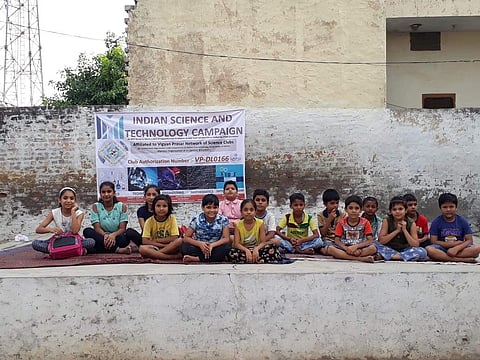
- News
- Campus
- Exam
- Podcast
- Web Stories
- Do You Know
- Path Finders - UG Programs
- Videos
- Book Review

'Practicality is everything' is what 18-year-old Aniket Gupta believes in. With the same approach, the youngster from Delhi wanted to make it easier for Indian students to learn the complex and hard concepts of science through interesting experiments. Aniket started the Indian Science and Technology Campaign two years ago in an attempt to strengthen scientific skills among children and youngsters, who lose their interest in subjects like science, mathematics at an early age mostly for the lack of practical training in schools.
Aniket, a student of Lovely Public Senior Secondary School in East Delhi, says that "In our education system currently, we don't have practicality, subjects are taught in a way that it becomes more theoretical and sometimes even uninteresting for students to learn. Especially, science, maths, engineering, and technology-related subjects, they are always considered to be boring. I myself have faced a similar kind of a problem while studying in school. That's when I and one of my friends took up this initiative to explain the complex, hard concepts of science through interesting experiments, practical and hands-on activities. We began first in our own class and in my own school, explained it to our teachers and other classmates and then eventually our school helped to scale up this initiative. Then we gradually moved on to government schools in the area. When I was in Class 10 I started this, now I just completed my Class 12 so it's been more than two years." Academically, Aniket wants to pursue Computer Science Engineering while also running this initiative in other cities.
Aniket tells us that initially, teachers were apprehensive and not too keen, they thought it to be a waste of time. Later they found it interesting and they began performing the experiments during the break/lunchtime in school. "When the other students also found the cause to resonate with their own lives, they also joined hands to develop, curate and make the practical programmes reach a larger base of students, school, and teachers," the 18-year-old adds.
Now, the initiative is being run by college students, teachers who wanted to volunteer for this cause. Being a school student himself, Aniket needed a lot of support to expand the activities in order to reach a larger group of students. His initiative got affiliation from the government organisation Vigyan Prasar and the Department of Science and Technology is also supporting him. "We had begun it as a classroom initiative, but now we would want to make it into a proper organisation and reach more kids. We also started conducting activities in Delhi government schools. We also began training teachers on how to use the activity kits in their classrooms," he says.
The initiative has also created a programme called Vigyan Manch that combines science with entrepreneurial skills to create innovative, economical, and constructive prototypes with worldwide benefits. This programme also helps students with basic facilities and funding from Aniket's school for their initial entrepreneur ventures. Aniket's initiative has already supported over 18,000 students and over 500 teachers and he believes that it has been so successful as kids prefer the simplified form of complex subjects.
Aniket received The Diana Award earlier this month in recognition of his work. Established in memory of Diana, Princess of Wales, The Diana Award is the most prestigious accolade a young person aged 9-25 years can receive for their social action or humanitarian work. This is the longest-running award for young people through a retrospective nomination process only. Through a rigorous process, these nominators have to demonstrate the nominee’s impact in five key areas: vision, social impact, inspiring others, youth leadership, and service journey. "I was overwhelmed to have been selected among so many youngsters from across the world. Princess Diana has been my idol since I was a child, I looked up to her always," says Aniket.
As for his future plans regarding his initiative, Aniket says, "I want to get children to develop efficient observation skills, just not mug up or learn the science experiments but to understand and perform them in real life. And also to understand the mechanism behind them. They will learn the basic skills this way and sharpen them as they go forward."
